| Pages:
1
..
4
5
6
7
8 |
Tyneman
Harmless

Posts: 17
Registered: 27-3-2019
Member Is Offline
|
|
Hey all.
I've been reading here for a long time. Now I couldn't resist posting.
I made some CHP by first making some TACP by tumbler method. Then converting it to CHP by porridge method. I will be making it directly in the near
future, But I wanted to do both preparations separately this time.
I love the stuff. It's non-toxic, environmental friendly and safe to handle. Only downside IMO is that it takes a lot to go DDT. I am used to making a
det from a drinking straw with 0,5g PETN and 0,02g PbN3. I upgraded to 4mm Al tubes. But this here is a different story.
I made a det like I normally do. Just used about 0,2g PETN pressed at about 50Kg for the plug. 0,1g CHP pressed at 50Kg and 0,2g CHP @ 1Kg. A bit of
fencepost prime and a fuse for ignition. Fuse was rolled thicker with maskingtape and crimped hard af.
That was a big failure. Just a spray from the fuse hole.
Allso made one like LL suggested. 8mm copper, small Al plug, 0,2g PETN @ 50Kg, 0,2g CHP @ 50Kg, 0,3g CHP @ 1Kg. Bickfort fuse rolled thicker with
electrical tape. (Goes way faster then masking tape) And crimped it tight.
I believe this one did go DDT.
It just feels like overkill to me to use such a big det. So my question Is: How small a detonator can we (I) make. Smaller ID, less CHP (although its
so cheap and safe), and preferably some other material as copper.
https://i.imgur.com/Snbwjdc.jpg
https://i.imgur.com/OVq7lLC.jpg
https://i.imgur.com/KuAPPJt.jpg
Indent on a 4mm thick steel plate. Det placed perpendicular on the surface. No hole, I still believe it went DDT.
https://i.imgur.com/Y8B1dtc.jpg
[Edited on 27-3-2019 by Tyneman]
|
|
|
Herr Haber
International Hazard
    
Posts: 1236
Registered: 29-1-2016
Member Is Offline
Mood: No Mood
|
|
I remember I saw a post on SM years ago where someone wanted to use the aluminium tube of his arrows for the same purpose.
I'd try fiberglass if I were you. Share the results if you do !
My own recommendation is that you go to your nearest model / RC shop.
You'll be amazed how many bars and tubes they usually have. Brass, copper, aluminum of several sizes and thicknesses. You'll leave with what you were
looking for and probably more...
|
|
|
Laboratory of Liptakov
International Hazard
    
Posts: 1414
Registered: 2-9-2014
Location: Technion Haifa
Member Is Offline
Mood: old jew
|
|
CHP
CHP works even in diameter 4 mm / 6 mm copper tube, or same diameter steel tube. Pressing is smaller, for example output segment 25 Kg and DDT segment
0,5 Kg. Maybe is possible also use Aluminium thin cavity and over deploy fiberglass tube. Or use fiberglass tube only. Here is example using both
copper tubes and Booster 4,5 g. Even this small detonator, works reliable.
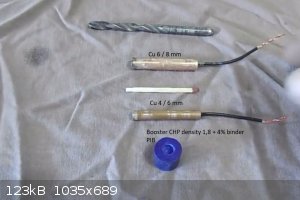
Your detonators look horrible. Especially Copper is too short. Will better use as plug some glue on metal. And longer cavity.
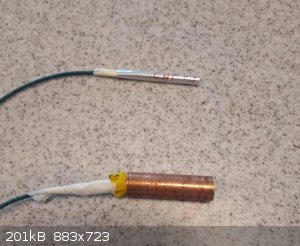
[Edited on 27-3-2019 by Laboratory of Liptakov]
However, detonator on the CHP base (system Berta) is especially for construction electric initiation. And not for non quality amateur fuse type
detonator.
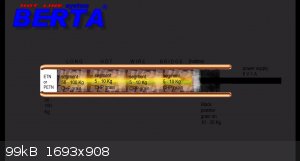
[Edited on 27-3-2019 by Laboratory of Liptakov]
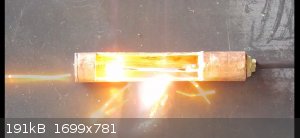
[Edited on 27-3-2019 by Laboratory of Liptakov]
Development of primarily - secondary substances CHP (2015) Lithex (2022) Brightelite (2023) Nitrocelite and KC primer (2024)
|
|
|
MineMan
International Hazard
    
Posts: 1014
Registered: 29-3-2015
Member Is Offline
Mood: No Mood
|
|
That last picture is really intriguing LL. How did you make such amazing sparks!? What does your bridge look like?
|
|
|
Laboratory of Liptakov
International Hazard
    
Posts: 1414
Registered: 2-9-2014
Location: Technion Haifa
Member Is Offline
Mood: old jew
|
|
Last picture is specimen, sample for explanation. Downloaded from stop video. Bridge is from scourer for dishes. Is it flat ferro-steel wire with
nickel surface. Very cheap, very available, soldering very easy. From one the scourer you can do 500 - 1000 hot bridges. Available in any shop. And
prarctically free... ...LL ...LL
Development of primarily - secondary substances CHP (2015) Lithex (2022) Brightelite (2023) Nitrocelite and KC primer (2024)
|
|
|
Tyneman
Harmless

Posts: 17
Registered: 27-3-2019
Member Is Offline
|
|
| Quote: | | Your detonators look horrible. |
I am sorry LL. I really hope you find these next ones to be more aesthetically pleasing.
| Quote: | | However, detonator on the CHP base (system Berta) is especially for construction electric initiation. |
I did find this picture you posted using Bickfort (Or Monetti)fuse.

That is the construction I used for the detonators. Casing was 6mm ID 8mm OD Al tubing from the hardware store. 8mm Copper just doesn't feel right to
me.

I used different bottom sections for each.
1 0,2g PETN @ >50Kg
2 0,3g CHP @ >50Kg
3 0,3g CHP/PETN 60/40 @ >50Kg
4 was as pictured with electric ignition
Since I can not roll out 10+ meter leads without people asking questions I really favor the fuse-type detonators.
Results were satisfying. Dets placed perpendicular on a 4mm steel plate.
left to right 1, 2 and 3

Top to bottom 1, 2 and 3

Showing that CHP/PETN mixed is more powerful compared to the separate powders.
Number 4 was set off not on a plate but burried because I couldn't roll long enough leads. Made a nice little hole, not worth the pic.
All in all I am really starting to like this CHP stuff. Thank you Dr L. for this nice invention.
|
|
|
Laboratory of Liptakov
International Hazard
    
Posts: 1414
Registered: 2-9-2014
Location: Technion Haifa
Member Is Offline
Mood: old jew
|
|
OK...number 3 is very good result for 4 mm plate and Alu cavity 8/6. Is it full detonation. But PETN is less senzitive on CHP than ETN. Better ratio
is 50 CHP/ 50 PETN. For ETN works 25 CHP /75 ETN. Any way, thanks for sharing for others researchers here. Clear pictures. If is were use copper
cavity 8/6 at number 3, in plate should by hole 4 mm. If steel tube in a same conditions, so 3 mm hole in 4 steel. Copper tube has always best
brizantion. (penetration effect) Is there similar effec as for shaped charges. Shortly, the liquide copper easy penetrate anything because is heavy.
Aluminium not.
You can testing under the Heap of sawdust. Without problems with environment, neighbours and similarly. Sawdust has not any influence on results. The
Sand yes.... ...LL ...LL
Development of primarily - secondary substances CHP (2015) Lithex (2022) Brightelite (2023) Nitrocelite and KC primer (2024)
|
|
|
Laboratory of Liptakov
International Hazard
    
Posts: 1414
Registered: 2-9-2014
Location: Technion Haifa
Member Is Offline
Mood: old jew
|
|
Here is result for comparation in copper cavity.
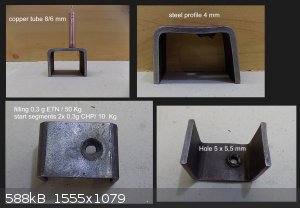
Development of primarily - secondary substances CHP (2015) Lithex (2022) Brightelite (2023) Nitrocelite and KC primer (2024)
|
|
|
MineMan
International Hazard
    
Posts: 1014
Registered: 29-3-2015
Member Is Offline
Mood: No Mood
|
|
LL. You did two segments of .3g CHP? What grain size? Any way to make this detonator with a single grain size?
|
|
|
Laboratory of Liptakov
International Hazard
    
Posts: 1414
Registered: 2-9-2014
Location: Technion Haifa
Member Is Offline
Mood: old jew
|
|
CHP
CHP is firstly the porridge (mixture TACP88+ AP6 +Hex6+ drops NH4OH) and under warm air from hair fan is during 2 minute create wet pieces of size 5
mm approximately. In some bowl, plast or stainless steel. At mixing constantly with spoon. This wet pieces are slightly pressed (same spoon) through
sieve 1x1. And fall on innert plate at 50 C. Drying 5 - 10 minute. Not longer! CHP can loss DDT properties. (big loss NH3 from molecule) Ready for
filling. Very small grain (10-20% ) is possible separe on fine sieve 0,2 mm.
Development of primarily - secondary substances CHP (2015) Lithex (2022) Brightelite (2023) Nitrocelite and KC primer (2024)
|
|
|
MineMan
International Hazard
    
Posts: 1014
Registered: 29-3-2015
Member Is Offline
Mood: No Mood
|
|
Ok. But in the test above you did two segments with the same mass and grain size and pressing pressure?
|
|
|
Laboratory of Liptakov
International Hazard
    
Posts: 1414
Registered: 2-9-2014
Location: Technion Haifa
Member Is Offline
Mood: old jew
|
|
Exact pressure is not super important. Something between 10 - 30 Kg for an 8 mm cavity. The 500 mg output segment is pressed first. It can be pure ETN
or CHP. In the vise. The second segment (of CHP) weight 150 mg is pressed to 30 Kg. Handle estimate pressure. Followed two 400mg CHP segments. Which
are pressed around the resistance bridge, around the wires. Pressure 10 Kg. This is followed by refilling the entire tube (usually 45 mm high) with
classic gunpowder, which serves as a seal. Or as active seal. Again pressed on 10 kg. Usually 300 mg.
Development of primarily - secondary substances CHP (2015) Lithex (2022) Brightelite (2023) Nitrocelite and KC primer (2024)
|
|
|
MineMan
International Hazard
    
Posts: 1014
Registered: 29-3-2015
Member Is Offline
Mood: No Mood
|
|
Quote: Originally posted by Laboratory of Liptakov  | | Exact pressure is not super important. Something between 10 - 30 Kg for an 8 mm cavity. The 500 mg output segment is pressed first. It can be pure ETN
or CHP. In the vise. The second segment (of CHP) weight 150 mg is pressed to 30 Kg. Handle estimate pressure. Followed two 400mg CHP segments. Which
are pressed around the resistance bridge, around the wires. Pressure 10 Kg. This is followed by refilling the entire tube (usually 45 mm high) with
classic gunpowder, which serves as a seal. Or as active seal. Again pressed on 10 kg. Usually 300 mg. |
In one of this thread your picture posted yesterday shows just 3 segments. The output and two .3gram segments.... pressed to 10kg. This is much simple
than you mentioned above? Am I mistaken?
For 4mm det you said many moons ago that three segments of .3g, .2g, .2 or .15 works when pressed to different pressures....
I am asking, for 4mm can it be .3g output (50kg), .2g(10kg), .2g(10kg) all 1mm with no fines (below.2mm) and .1g smokeless powder??
[Edited on 18-4-2019 by MineMan]
|
|
|
Laboratory of Liptakov
International Hazard
    
Posts: 1414
Registered: 2-9-2014
Location: Technion Haifa
Member Is Offline
Mood: old jew
|
|
For cavity inner diameter 4 mm, I recommend output segment 0,2g on 25 Kg, next 0,15g on 5 Kg, next 0,15g on 5 Kg and BP plug
0,1g on 5 Kg. Should by works it. But can be 40 Kg, 10 Kg, 10 Kg, 10 Kg. And it will works also. In solid cavity 1 mm wall. Or wall 0,7 mm also is
still good.
Development of primarily - secondary substances CHP (2015) Lithex (2022) Brightelite (2023) Nitrocelite and KC primer (2024)
|
|
|
Laboratory of Liptakov
International Hazard
    
Posts: 1414
Registered: 2-9-2014
Location: Technion Haifa
Member Is Offline
Mood: old jew
|
|
Special test for MineMan
Here is example, system works even in thin brass cavity:
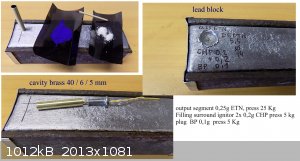
Development of primarily - secondary substances CHP (2015) Lithex (2022) Brightelite (2023) Nitrocelite and KC primer (2024)
|
|
|
MineMan
International Hazard
    
Posts: 1014
Registered: 29-3-2015
Member Is Offline
Mood: No Mood
|
|
Fantastic!! Thank you for doing this test LL!! This confirms my suspicion, CHP is capable of more than we think...
This brass tube, it still looks heavily confined, how thick is it? Any chance this will work in a .5mm thick Al tube... I want to minimize any
shrapnel potential, allthough this maybe uneccesary. CHP May have better DDT properties when excess NH4CLO4 is used. For an OB of +15.
Or. If we can find a thick steel sleeve (2mm thick, 2mm orfice) to fit inside an Al tube. CHP should be able to act as a primary with amounts of only
200mg needed. Perhaps. I wonder, CHP mixed with magnesium and PP should DDT instantly. Mg should be safe opposed to Al powder?
|
|
|
Laboratory of Liptakov
International Hazard
    
Posts: 1414
Registered: 2-9-2014
Location: Technion Haifa
Member Is Offline
Mood: old jew
|
|
CHP
Really, you have the truth. Excess of NH4ClO4 (in TACP) increase DDT properties. Exist also base mixture, which is only from TACP+AP. Without
hexamine. TACP 86% + AP 14%. = 0B + 17,23. And this mixture is pretty reliable. Of course, PP can increase DDT also, similarly as AP. Aluminium or
Magnesium also can increase easy DDT. But Al or Mg create with TACP electric cell. Is it not best idea. Generally, the research about properties CHP
or TACP + "something" is not on the end. Same situation is abour cavities. All types of cavities are not yet examinated. Is it an large field, big
field for next research of DDT and for establishing best mixture TACP + xy.... ...LL ...LL
(in picture is brass diameter 6/5 mm = wall 0,5 mm.)
[Edited on 19-4-2019 by Laboratory of Liptakov]
Development of primarily - secondary substances CHP (2015) Lithex (2022) Brightelite (2023) Nitrocelite and KC primer (2024)
|
|
|
MineMan
International Hazard
    
Posts: 1014
Registered: 29-3-2015
Member Is Offline
Mood: No Mood
|
|
Quote: Originally posted by Laboratory of Liptakov  | Really, you have the truth. Excess of NH4ClO4 (in TACP) increase DDT properties. Exist also base mixture, which is only from TACP+AP. Without
hexamine. TACP 86% + AP 14%. = 0B + 17,23. And this mixture is pretty reliable. Of course, PP can increase DDT also, similarly as AP. Aluminium or
Magnesium also can increase easy DDT. But Al or Mg create with TACP electric cell. Is it not best idea. Generally, the research about properties CHP
or TACP + "something" is not on the end. Same situation is abour cavities. All types of cavities are not yet examinated. Is it an large field, big
field for next research of DDT and for establishing best mixture TACP + xy.... ...LL ...LL
(in picture is brass diameter 6/5 mm = wall 0,5 mm.)
[Edited on 19-4-2019 by Laboratory of Liptakov] |
I see. This is fantastic. The progress you have made... and to wonder what we will know next month, next year!
For DDT I firmly believe nitrogen fuels are needed... which is why both hexamine and glycine work. I have had success with creatine in other mixtures
also. But, there must exist a powder fuel with higher nitrogen then hexamine... but I have yet to find.... do you know???
I do wonder too what would happen with the addition of a small amount of metal fuel nitride. For example aluminum or magnesium nitride. Making the
electric reaction between TACP and that metal inert while giving off N during burning!! And lots of N!
|
|
|
Laboratory of Liptakov
International Hazard
    
Posts: 1414
Registered: 2-9-2014
Location: Technion Haifa
Member Is Offline
Mood: old jew
|
|
Great the Idea, create TACP replete solution and use different metal of electrodes...Maybe Mad Idea..... ...LL ...LL
Development of primarily - secondary substances CHP (2015) Lithex (2022) Brightelite (2023) Nitrocelite and KC primer (2024)
|
|
|
MineMan
International Hazard
    
Posts: 1014
Registered: 29-3-2015
Member Is Offline
Mood: No Mood
|
|
Do you mean the metal nitrites? Idk if it would work. We need a PHILOU to tell us.... I don’t even know if metal nitrides burn well since nitrogen
does have some electro negativity.
|
|
|
Laboratory of Liptakov
International Hazard
    
Posts: 1414
Registered: 2-9-2014
Location: Technion Haifa
Member Is Offline
Mood: old jew
|
|
Yes, Philou....He has some chemical holiday of what? ......
Philou, please, early we will do it electrolysis of TACP......How electrodes use? What will happen?....
Development of primarily - secondary substances CHP (2015) Lithex (2022) Brightelite (2023) Nitrocelite and KC primer (2024)
|
|
|
MineMan
International Hazard
    
Posts: 1014
Registered: 29-3-2015
Member Is Offline
Mood: No Mood
|
|
LL. Titanium nitride is the only nitride I can find to buy. Titanium nitride oxidizes at 800C.
Do you want to try some LL??
|
|
|
Laboratory of Liptakov
International Hazard
    
Posts: 1414
Registered: 2-9-2014
Location: Technion Haifa
Member Is Offline
Mood: old jew
|
|
I estimate that I will stay with the TACP for exploring conventional /organic fuels.
Development of primarily - secondary substances CHP (2015) Lithex (2022) Brightelite (2023) Nitrocelite and KC primer (2024)
|
|
|
MineMan
International Hazard
    
Posts: 1014
Registered: 29-3-2015
Member Is Offline
Mood: No Mood
|
|
One issue I have with TACP is much is still dissolved in the ammonia, even when cooled. I know supercritical CO2 is used for the shock gel process.
Could pieces of dry ice (solid CO2) be dropped into the ammonia TACP solution to precipitate TACP???
|
|
|
Laboratory of Liptakov
International Hazard
    
Posts: 1414
Registered: 2-9-2014
Location: Technion Haifa
Member Is Offline
Mood: old jew
|
|
As an attempt is it interesting. Is possible try it. But with classic preparation in closure jar, are yields high always. On insert AP (as strategic
compound) for example 10g AP + 2,66 CuO + 30g NH4OH (25%) are yields 11 - 12,5 g TACP. Is not reason use special methodes for extraction from
solution. Thats better the mother liquer (residuum from reaction) boil and decompose on AP + CuO. And useing both compound as adding for next basic
reaction. Base of best precipitation is of course Amm. water 24 - 26% and cooling on - 10 C. Ammonia water used for start 10% is serious problem, for
example. Therefor is best use closure jar, without smell and without evaporate of NH3.
[Edited on 27-4-2019 by Laboratory of Liptakov]
Development of primarily - secondary substances CHP (2015) Lithex (2022) Brightelite (2023) Nitrocelite and KC primer (2024)
|
|
|
| Pages:
1
..
4
5
6
7
8 |